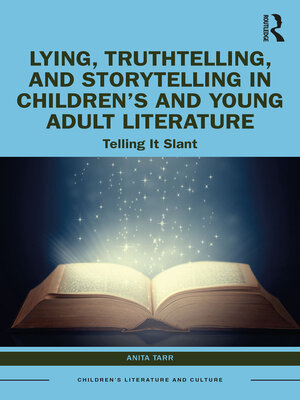Lying, Truthtelling, and Storytelling in Children's and Young Adult Literature
ebook ∣ Telling It Slant · Children's Literature and Culture
By Anita Tarr

Sign up to save your library
With an OverDrive account, you can save your favorite libraries for at-a-glance information about availability. Find out more about OverDrive accounts.
Find this title in Libby, the library reading app by OverDrive.



Search for a digital library with this title
Title found at these libraries:
| Library Name | Distance |
|---|---|
| Loading... |
Even though we instruct our children not to lie, the truth is that lying is a fundamental part of children's development—socially, cognitively, emotionally, morally. Lying can sometimes be more compassionate than telling the truth, even more ethical. Reading specific children's books can instruct child readers how to be guided by an etiquette of lying, to know when to tell the truth and when to lie. Equally important, these stories can help prevent them from being prey to those liars who are intent on taking advantage of them. Becoming a critical reader requires that one learn how to lie judiciously as well as to see through others' lies. When humans first began to speak, we began to lie. When we began to lie, we started telling stories. This is the paradox, that in order to tell truthful stories, we must be good liars. Novels about child-artists showcased here illustrate how the protagonist embraces this paradox, accepting the stigma that a writer is a liar who tells the truth. Emily Dickinson's phrase "tell it slant" best expresses the vision of how writers for children and young adults negotiate the conundrum of both protecting child readers and teaching them to protect themselves. This volume explores the pervasiveness of lying as well as the necessity for lying in our society; the origins of lying as connected to language acquisition; the realization that storytelling is both lying and truthtelling; and the negotiations child-artists must process in order to grasp the paradox that to become storytellers they must become expert liars and lie-detectors.







